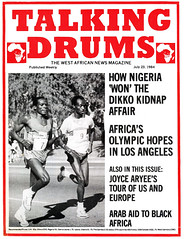What The Papers Say
Code of conduct for the Army
National Concord, Lagos
The years of military rule in this country have seen some remarkable rancorous relations between members of the armed forces and civilians. We have seen jungle justice perpetrated by men of our forces. In a show of brute force, they have set property ablaze, beat up passers-by and left many hospitalised. Many men in uniform have little or no patience for the normal processes of the law.
In 1978, some soldiers in Kano took laws into their hands, burning vehicles and causing social dislocation on account of the death of one of their colleagues.
Displaying beastly action in 1981, they set vehicles ablaze and inflicted injuries on innocent civilians over the death of a soldier knocked down by a car directly under a pedestrian overhead bridge in Lagos.
In March this year, a group of Navy men stormed Customs quarters in Lagos and left it in shambles and some innocent people hospitalised because of verbal exchanges between a Navy man and a Customs man.
Most recently, a taxi driver was beaten-up mercilessly by some soldiers in Yaba, Lagos.
These are random samples. There are innumerable cases involving men of our armed forces, in which defenceless civilians have been undeservedly subjected to indignities and serious injuries.
Examples abound, where men in uniform invaded public places with horse whips and guns, threatening lives. Some military men are in the habit of breaking traffic rules and other regulations. By the frequency that military men use horse whip (koboko), many people think it is part of the military uniform.
It is against this perspective that we view the importance of the recent announcement by Chief of Army Staff, Major-General Ibrahim Babaginda that a code of conduct is being enacted for the Army. It is indeed a very laudable initiative. It is commendable that the authorities have their minds beamed on instilling discipline in the Army, thus improving army/civilian relationship. As the Army boss rightly observed: "The armed forces are being looked upon to provide leadership through example and exemplary conduct."
The armed forces of our country need public support now more than ever before for improved relationship with civilians. There is a misconception especially among junior ranks that military uniform confers status of a special breed on those who wear it. The false impression is also created among them that under a military rule, everyone must be subjected to military discipline. This is why it is common to see civilians ordered by uniformed men to frog-jump in public for alleged misdeed.
While commending the initiative of the Army authorities for the wisdom in introducing the code of conduct, we think the code should be widely publicised. This will not only educate civilians on their rights while dealing with the military personnel but restore public confidence in the members of the armed forces.
The FO and Dr Dikko
The Observer, London
The extraordinary attempt to snatch Dr Umaru Dikko from his London home under the noses of the British authorities and to freight him back in a box to Lagos very nearly succeeded. But for a few details of labelling on the crates containing Dr Dikko and his captors, and the absence of the proper documentation, the human cargo could have been properly classified as diplomatic baggage under that wonderfully elastic convention negotiated in Vienna which governs such matters...Abduction is a serious crime, and in this case an unnecessary one. If the Nigerian authorities have evidence that Dr Dikko, or any other Nigerian exile in Britain, has committed serious crimes, then they should present that evidence and seek extradition through the Fugitive Offenders Act. By general consent, they would not achieve such extradition unless the offenders were promised a fair trial in open court. British courts are rightly reluctant to extradite people to face trial by closed military tribunal.
It is perfectly understandable that the Nigerian authorities should wish to put on trial those it believes responsible for crimes of corruption and election rigging. But such trials must be seen to be open and fair if a British court is expected to agree to extradition...
